Thursday, September 5, 2002
The Mesa Falls Scenic Byway begins at Ashton, Idaho, passes
through the Targhee National Forest, and meanders its way north
along Henry's Fork of the Snake River. There was very little
traffic this morning, and we saw two moose standing in the
road.
The most spectacular scenery on the byway are the Lower and
Upper Mesa Falls, two of the last undisturbed waterfalls in the
West. First we came to Lower Mesa Falls, where the river is sqeezed
into a gorge that drops 65 feet. We had the place all to
ourselves.
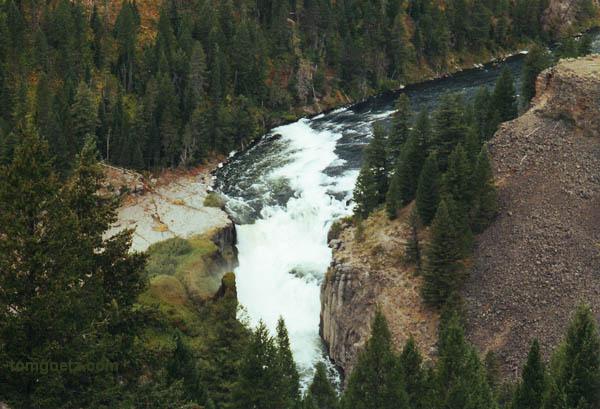
Lower Mesa Falls
Even more fantastic is the powerful Upper Mesa Falls, over
300 feet wide and crashing down 114 feet to the river below. On
most days, if you visit the falls before noon, the sun reflects in
the mist caused by the water's 11-story plunge and displays a
beautiful rainbow. It was overcast this morning, but the sun came
out for a few minutes just at the right time. Spectacular!
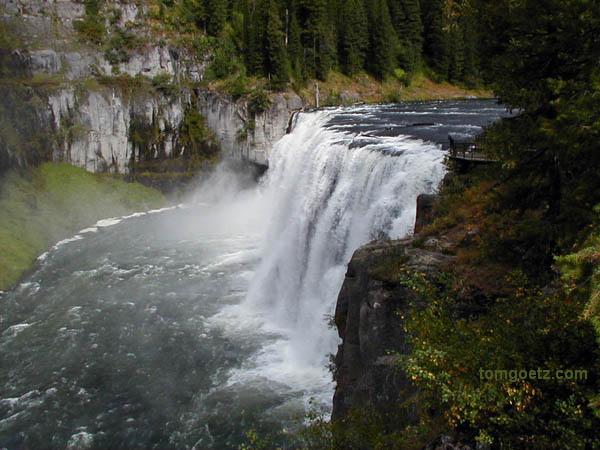
Upper Mesa Falls
Early in the afternoon we passed through the tiny tourist
town of West Yellowstone and entered Yellowstone National Park,
established in 1872, our nation's oldest and greatest national
park. At 2.2 million acres, it's also one of the largest national
parks. The thermal features of Yellowstone include geysers, hot
springs, fumaroles (steam vents), and mud pots. Only three other
locations in the world have large concentrations of hydrothermal
features - Iceland, New Zealand, and the Kamchatka region of
Siberia. Add to this the fact that Yellowstone is the most abundant
large animal habitat in the lower 48 states, and you can see why
it's my favorite!
The west entrance road closely parallels the Madison River,
apparently VERY popular with fly fishermen. We saw our first
Yellowstone wildlife at the Madison Junction, a huge elk!
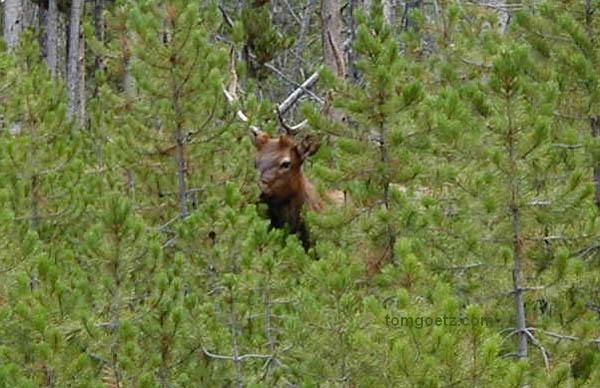
Elk hide-and-seek, Yellowstone National Park
Firehole Canyon Road, just south of Madison Junction, winds
for two miles through a narrow, steep canyon and passes by the
40-foot Firehole Falls. Several families were swimming and playing
here in the hot-springs-warmed water, one of the few places in
Yellowstone where swimming is openly allowed.
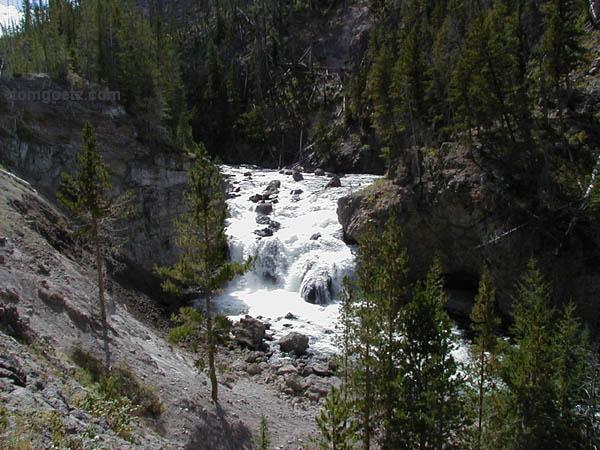
Firehole Canyon Cascade
Fountain Flat Drive follows along the Firehole River through
grassy meadows. There were dozens and dozens of bison here. Bison
are very cool the first time you see one but quickly become as dull
as cows.
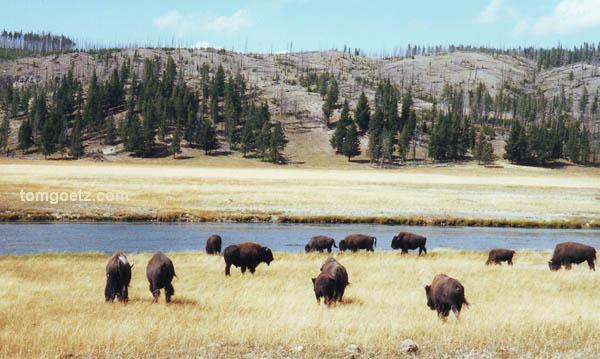
Roaming buffalo
At the Fountain Paint Pots trail you can see all four of the
geothermal features, geysers, hot springs, fumaroles, and mud pots,
along a half-mile boardwalk. Many trails in Yellowstone are on
boardwalks to prevent the earth from crumbling underneath someone's
feet, plunging them into a boiling pool. Works for me. Some of the
mud pots and springs are wonderfully colorful due to the different
minerals in the water.
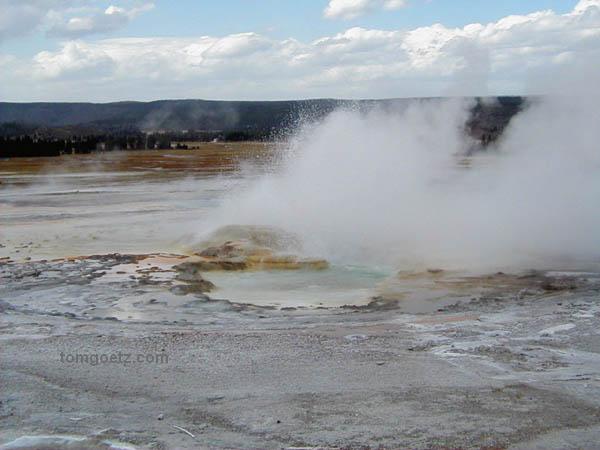
The earth is alive - Fountain Paint Pots
Firehole Lake Drive is a three-mile road through Lower Geyser
Basin, Yellowstone's most extensive geyser basin. White Dome Geyser
is believed to be one of the oldest geysers in the park. Every ten
minutes to three hours it erupts 30 feet into the air.
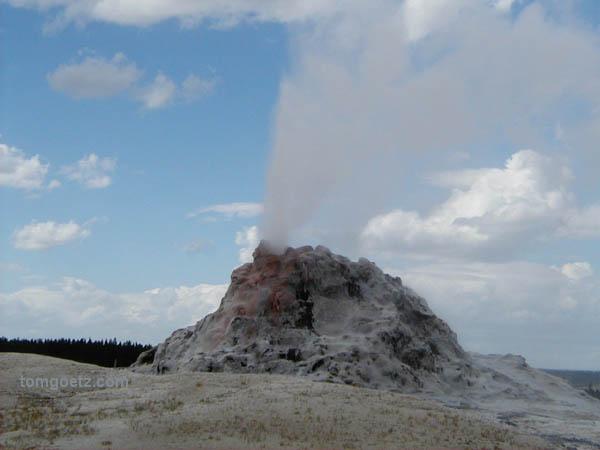
White Dome Geyser in eruption
A footbridge at Midway Geyser Basin takes you over the deep
blue Firehole River. Excelsior Geyser, actually a hot spring, pours
4,000 gallons of water per minute into the river. Grand Prismatic
Spring is Yellowstone's largest hot spring, over 370 feet across.
The brilliant colors at the edges of the pool are from algae and
bacteria living in the 170-degree water.
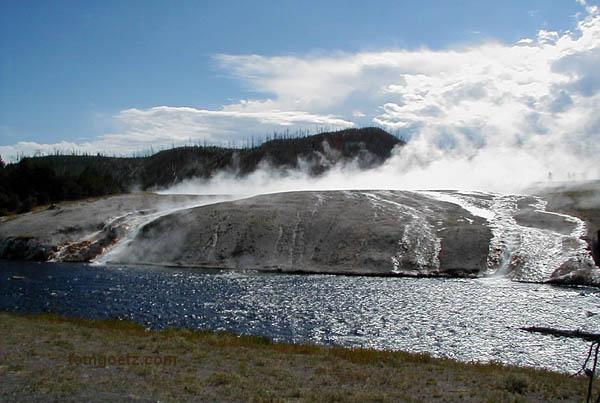
Firehole River
Bear sighting! No more than 100 yards from the road we saw a
mama grizzly bear feeding fish to her two babies. Wow! We watched
for a few minutes and then moved on so other people could see. I
drove a short distance further and looked back to observe the bear
jam - you know, a traffic jam caused by bear-gazers.
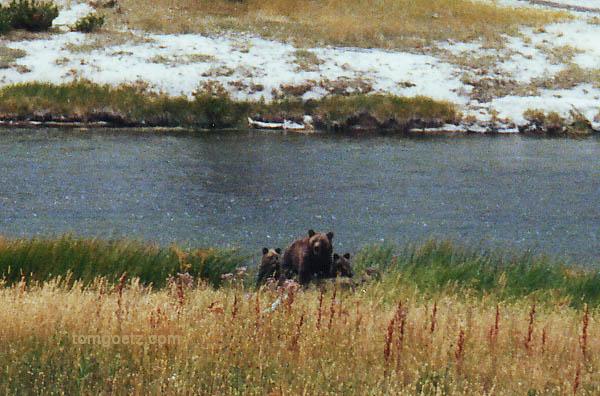
Grizzly mama and kids
Next was Biscuit Basin, Black Sand Basin, and then the most
visited geyser in the world and the most popular attraction in
Yellowstone, Old Faithful, in Upper Geyser Basin. A coyote was
roaming in the parking lot here looking for handouts. He reminded
me of Spike-dog!
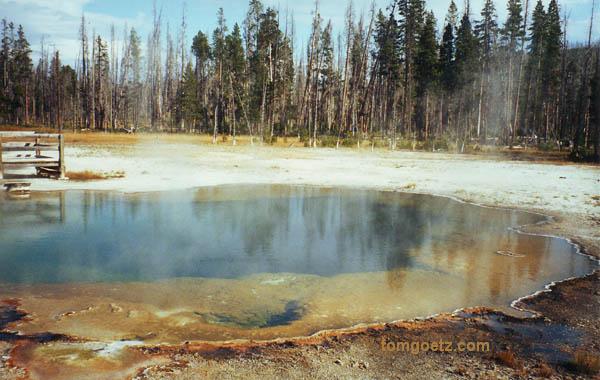
Emerald Pool, Black Sand Basin
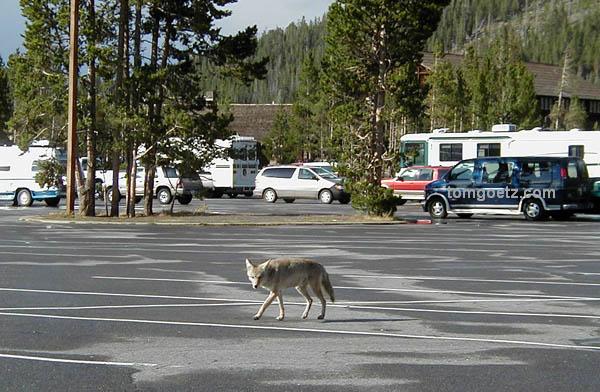
Hmmm, looks wily.
We spent an hour or so walking the boardwalks and paved
trails around Geyser Hill, home to more than 40 different geysers.
Upper Geyser Basin is the largest concentration of geysers in the
world.
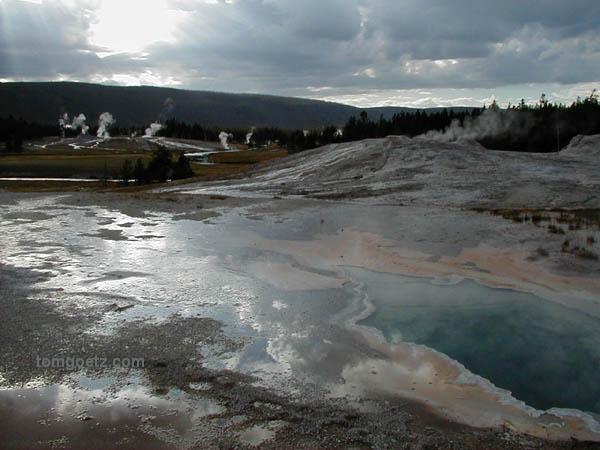
Upper Geyser Basin
Approximately every 92 minutes, Old Faithful erupts for 1.5
to 5 minutes, expelling 3,700-8,400 gallons of boiling water, and
reaching a height of 100-185 feet. The bigger it blows, the longer
till the next eruption, and vice versa. Sometimes I feel like Old
Faithful is so famous that the other wonderful geysers get short
shrift, but I suppose geysers aren't actually vain and don't really
need the notoriety.
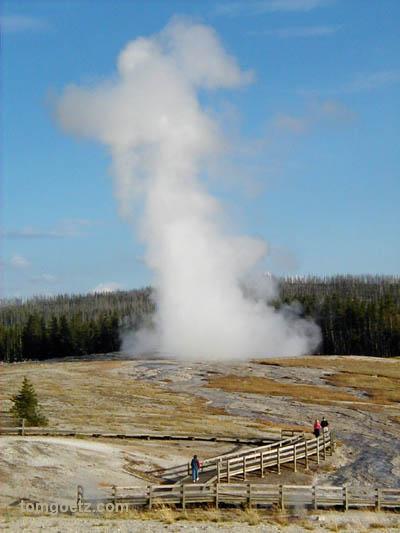
Thar she blows!
Two miles south of Old Faithful we stopped at Kepler
Cascades, which drops 100-150 feet, depending on who's
measuring.
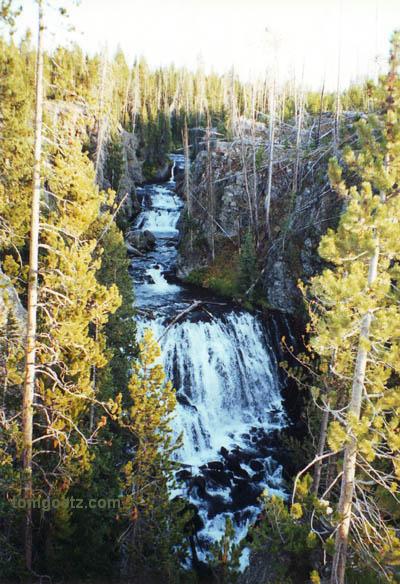
Keplar Cascades
We made it to the West Thumb of Yellowstone Lake for sunset.
There were mountains in the background and steaming springs and
fumaroles in the foreground - beautiful and otherworldly.
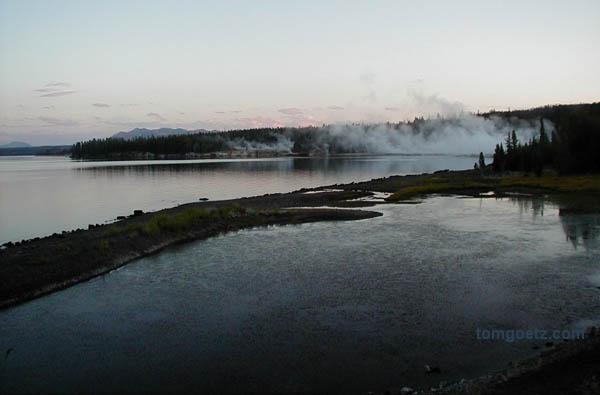
The ethereal Yellowstone Lake
The rest of our drive to Canyon Village was in the dark. We
had to be as careful as possible not to hit a wayward deer (or
something even bigger). A "Pioneer" cabin is $56/night, and we're
here in one place for three whole nights, a record for us. The
cabin is a simple, motel-style room with two twin beds and a
private bath, no TV, no radio, no phone. Canyon Village is
centrally located in the park and has a gift store, picnic shop,
restaurant, and cafeteria. The restaurant was the only thing still
open when we arrived at 7:00 p.m., and since there was a two-hour
wait, we ended up with a cookie for dinner instead, left over from
breakfast.
It's barely even September, but most of the Yellowstone's
lodging closes down next week for the winter. Most of the park is
over 7,500 feet in elevation, and it gets cold early! Only the
lodges at Mammoth Hot Springs and Old Faithful are open year
round.
The sky is so clear here you can see the Milky Way!
169 scenery-filled miles today.
|














